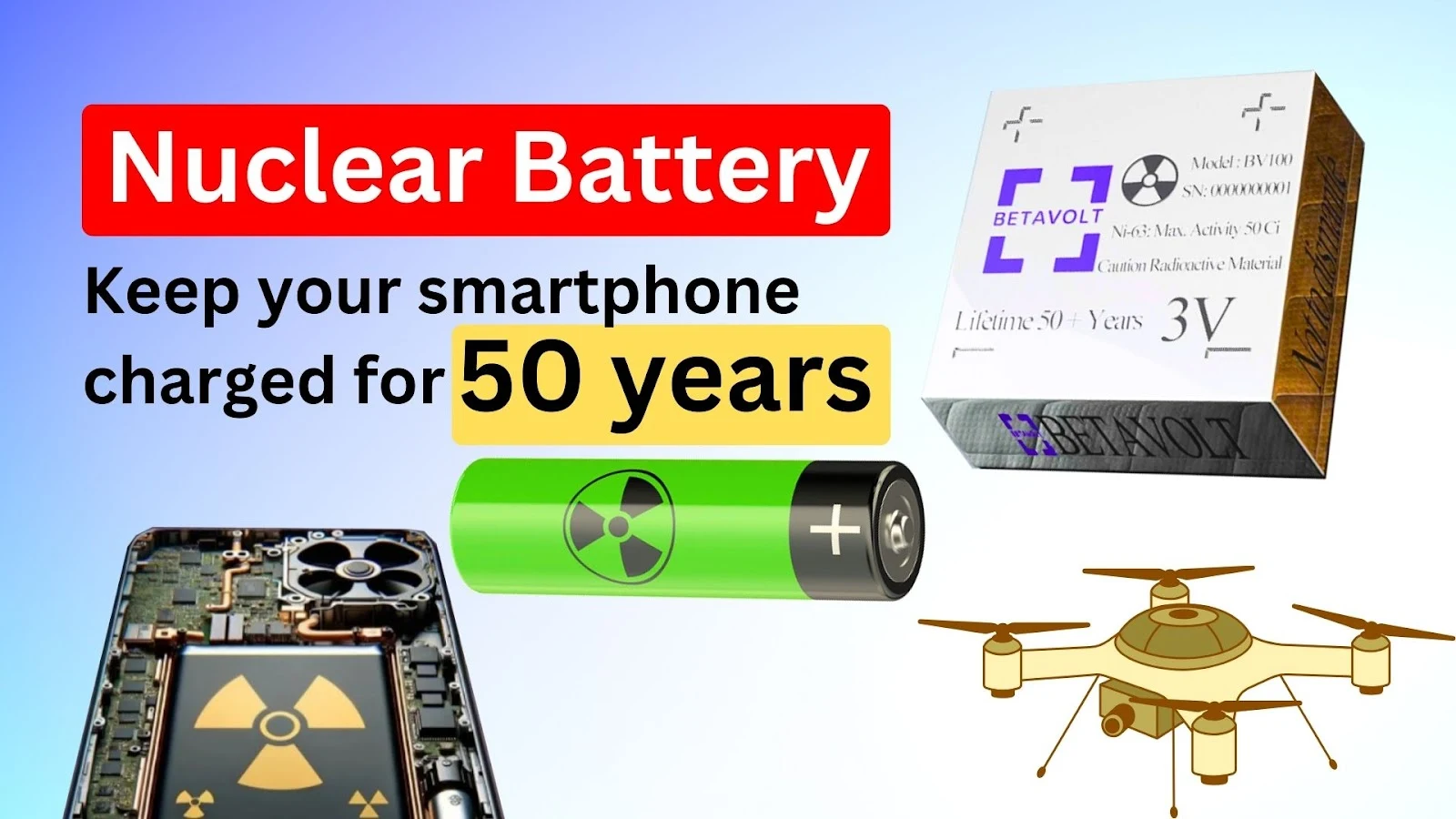📢 Nuclear Battery to keep smartphones charged for 50 years
Discover Betavolt's nuclear battery – 50 years of uninterrupted power, revolutionizing electronics. Say goodbye to charging hassles!- Story published by Kunal Chowdhury on .
Discover Betavolt's nuclear battery – 50 years of uninterrupted power, revolutionizing electronics. Say goodbye to charging hassles!- Story published by Kunal Chowdhury on .
In a groundbreaking development, Chinese startup Betavolt has unveiled a revolutionary nuclear battery capable of powering devices for an astonishing 50 years without the need for recharging. This miniaturized atomic energy system has the potential to reshape the landscape of electronic devices, providing a continuous and enduring power source.
Let's delve into the details of this technological marvel and explore its implications for the future.

Betavolt's nuclear battery relies on a compact arrangement of 63 nuclear isotopes, housed within a module smaller than a coin. This innovative technology converts the energy released from decaying isotopes into electricity, a concept initially explored in the 20th century but now realized by Betavolt.
The company has successfully conducted pilot testing and plans to mass-produce the battery for various applications, ranging from smartphones to drones.
In an official statement, Betavolt highlighted the versatility of its atomic energy batteries. These batteries can find applications in aerospace, AI equipment, medical devices, microprocessors, advanced sensors, small drones, and micro-robots.
The company envisions a future where their nuclear batteries power a wide array of devices, positioning China competitively in the emerging era of AI technology.
The initial nuclear battery developed by Betavolt is truly miniature, measuring a mere 15x15x5 cubic millimeters. Its design ensures safety by incorporating a layered structure that prevents the battery from catching fire or exploding under sudden force.
Moreover, the battery can operate in a broad temperature range, from -60 degrees Celsius to 120 degrees Celsius, making it suitable for various environmental conditions.
One of the primary concerns with nuclear energy is radiation. Betavolt, however, assures users that their battery is safe, with no external radiation. The company claims that its nuclear battery is suitable for use in medical devices inside the human body, such as pacemakers and cochlear implants.
After the decay period, the 63 isotopes transform into a stable, non-radioactive isotope of copper, posing no environmental threat or pollution.
Betavolt's BV100 battery, delivering 100 microwatts of power with a voltage of 3V, marks the beginning of a new era in electronic power sources. The company aims to produce a battery with 1 watt of power by 2025. The compact size of these nuclear batteries allows for easy scalability, with the potential for multiple units to be connected, thereby increasing power output.
Imagine a future where mobile phones never need to be charged, drones can fly indefinitely, and electronic devices operate continuously without degradation in capacity or lifespan.
Betavolt's nuclear battery has versatile applications in various fields, including aerospace, AI equipment, medical devices, microprocessors, advanced sensors, small drones, and micro-robots. The battery can be used in medical equipment such as cardiac pacemakers and cochlear implants, as it is safe and produces no external radiation.
The battery's compact size and broad temperature range make it suitable for various environmental conditions. The company aims to produce a battery with 1 watt of power by 2025, and the compact size of these nuclear batteries allows for easy scalability, with the potential for multiple units to be connected, thereby increasing power output.
The battery's potential applications include smartphones that never need charging, drones that can fly indefinitely, and electronic devices that operate continuously without degradation in capacity or lifespan.
Nuclear batteries offer several advantages over traditional batteries, including:
However, it is essential to note that nuclear batteries are more expensive than traditional batteries of the same size due to the increased capabilities of nuclear battery technology. Additionally, the use of radioactive isotopes in nuclear batteries presents challenges in terms of storage, shielding, and disposal.
The limitations of nuclear batteries compared to traditional batteries include:
While nuclear batteries offer several advantages, these limitations need to be considered when evaluating their suitability for specific applications.
Betavolt's groundbreaking nuclear battery represents a significant leap forward in electronic power technology. The elimination of the need for chargers or portable power banks opens up a world of possibilities for uninterrupted device usage.
As the company moves towards mass production, the future indeed looks promising, with Betavolt's nuclear battery poised to transform the way we use and perceive electronic devices.
[01] https://citylabs.net/technology-overview/nuclear-battery-technology/
[02] https://news.mit.edu/2021/nuclear-batteries-decarbon-0625
[03] https://techxplore.com/news/2021-06-nuclear-batteries-approach-carbon-free-energy.html
[04] http://large.stanford.edu/courses/2017/ph241/park-j1/
[05] https://www.reddit.com/r/framework/comments/1952uce/nuclearbased_battery_that_lasts_50_years_we_need/
[06] https://www.greencarcongress.com/2024/01/20240114-betavolt.html
[07] https://www.reddit.com/r/framework/comments/1952uce/nuclearbased_battery_that_lasts_50_years_we_need/
[08] https://www.neimagazine.com/news/newschinas-betavolt-develops-50-year-nuclear-battery-11439320
[09] https://newatlas.com/energy/betavolt-diamond-nuclear-battery/
[10] https://insideevs.com/news/704871/china-betavolt-atomic-energy-battery/
Thank you for visiting our website!
We value your engagement and would love to hear your thoughts. Don't forget to leave a comment below to share your feedback, opinions, or questions.
We believe in fostering an interactive and inclusive community, and your comments play a crucial role in creating that environment.